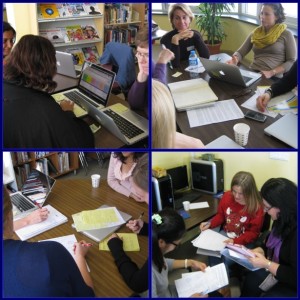I work in an International School in Istanbul. We run three International Baccalaureate (IB) programmes – the Primary Years Programme (PYP) 3 – 12 years old, The Middle Years Programme (MYP) 13 – 16 years old and the final two years the Diploma Programme (DP) 17 – 18 years old.. So our school pedagogical perspective is founded in the IB programmes. I am new to the IB and over the past four years I have been learning about the programmes.
The PYP programme is the one that has most links with Inquiry learning. In fact the IB website states that this is the intended goal of the programme. (“International Baccalaureate: Four Programmes,” n.d.) I feel very fortunate that as part of the Inquiry process our school provides whole days for each grade level to plan together every six weeks. The team comes together the plan the next unit of Inquiry and evaluate and reflect on the one just coming to an end. I am invited to each planning day and while I usually do not spend the whole day with my colleagues I certainly do spend at least 30 minutes with them working on resourcing, skills development. evaluation tools. Below is a gallery of some of the planning that happened last year on a Professional Development day on Inquiry Learning with Kath Murdoch, an expert on Inquiry Learning from Australia.
When I was thinking about the pedagogical initiatives we were asked to explore I chose the two that we have been using the most at our school. They are the Project Zero: Visible Thinking and the Habits of Mind.
Habits of Mind link closely with the two methods of learning and teaching as well although at no stage do they directly refer to Inquiry or project based learning. Habits such as persistence, thinking flexibly, thinking about thinking, questioning and posing problems,applying past knowledge to new situations, thinking and communicating with clarity and precision and remaining open to continuous learning are all vital for inquiry learners and project based learning (Costa & Kallick, 2008).
Kath Murdoch showed us how to use Visible Thinking and some of the thinking routines they promote to help students formulate questions, access prior knowledge and use information with purpose. Students are given specific thinking routines to help explore and show their thinking. While Inquiry Learning and Project based learning are not mentioned as such the strategies and skills Visible Thinking promote are integral parts of the processes.
So I guess you could say that Habits of Mind provides the theory and ideas while Visible Thinking from Project Zero provide some useful tools to assist the development of these habits of mind – all linking in with the necessary elements of Inquiry Learning.
I think the article that best summarised much of my thinking and aspirations in terms of involvement with curriculum development and delivery was found in an article about solo librarianship. Unsurprisingly the theme was that of all the resources in our libraries we, the librarians are the most precious resource (Karabush & Pleviak, 2011. p. 52). They assert that in the busy-ness of school and library life we must continually make the effort, and they quote Stephen Covey, to put first things first (Karabush & Pleviak, 2011. p. 49). The number one priority is teaching and learning which means we must be involved with curriculum development and delivery in our school whatever shape or form it takes. They suggest to simply get involved and offer a number of different strategies from attending meetings, planning days, developing committees – ensuring that we support high impact tasks (Karabush & Pleviak, 2011. p. 50)
If librarians miss the opportunity to be involved in these high impact tasks of curriculum development and delivery that means our colleagues and students miss out on appropriate resources to support their programmes, specific skills and strategies being taught at point of need and the scaffolding for success in the Inquiry Learning process.
It is my goal to always add value every opportunity I get within our school.
References
Costa, A., & Kallick, B. (2008). Learning and leading with habits of mind. Association for Supervision and Curriculum Development. Retrieved December 30, 2013, from http://www.ascd.org/publications/books/108008/chapters/Describing-the-Habits-of-Mind.aspx
Intentional Baccalaureate: Four Programmes at a Glance. (n.d.). Retrieved December 30, 2013 from http://www.ibo.org/programmes/index.cfm
Karabush, C., & Pleviak, P. (2011). Talk me off the Ledge. Knowledge Quest, 40(2), 48 – 53 http://search.ebscohost.com (AN 68942561)

